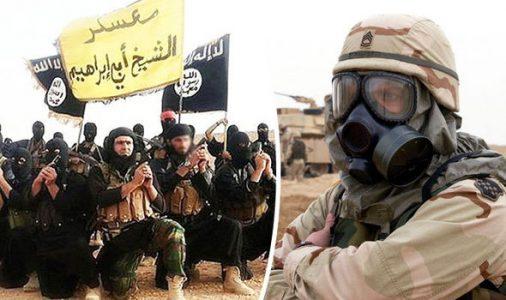
ISIS terrorists are using chemical weapons in Mosul again
The ISIS terrorists once again used chemical weapons against Iraqi troops and civilians, dropping mustard gas bombs on the al-Saura quarter, in the Southwestern part of the city of Mosul.
It is the eighth attack in which the terrorists have used chemical weapons. It was launched at a time when Iraqi government forces entered the district to rescue civilians.
Relevant reports said on Sunday that the Iraqi security forces arrested a group of ISIL members who were planning an attack with chemical weapons against army troops in Western Mosul.
Al-Sumariya News quoted an intelligence source saying the group was arrested while (Iraqi) government troops were patrolling al-Sihha district in Western Mosul in Nineveh province, adding that amounts of toxic substances were found within the groups possession.
The ISIL militants have used chemical weapons several times against the Iraqi soldiers and civilians in the city of Mosul, since the army troops started the special operation to recapture terrorist group’s de facto capital.
The Iraqi troops’ progress in the old city center is much slower than the early phases of the military operation by the stubborn resistance of ISIL militants, in addition to the orders to the Soldiers that restricted the use of heavy bombings and increased sniper fire against the terrorists holed up in densely populated areas to reduce civilian casualties.
Meanwhile, the army’s advance has hardly moved for more than a month at the edges of the old city center as the federal police and special forces, known as Rapid Response, have been fighting heavy back and forth clashes against ISIL militants in the narrow streets in the old neighborhoods around the historical al-Nuri Mosque in the middle of Mosul’s city center.
Mosul’s al-Nuri mosque is highly symbolic because it was there that leader of the ISIL Takfiri terrorist group, Ibrahim al-Samarrai, also known as Abu Bakr al-Baghdadi, declared himself the so-called caliphate of the terror group, shortly after the flashpoint city fell to terrorists in June 2014 and became their de facto capital in the Arab country.
According to latest reports, nearly 400,000 people are trapped in the area controlled by the ISIL terrorists, as Iraqi forces make slow progress in liberating the rest of the second largest city in Iraq from the militants. Baghdad also announced that the number of people who have managed to flee the ISIL terrorists in Mosul has reached 500,000.
Iraqi Prime Minister Haider Abadi announced in October 2016, the start of a military operation to recapture Mosul, the second largest city in Iraq which fell to the ISIL since 2014.
The Iraqi defense ministry announced earlier in January that the ISIL terrorist group lost over 50 percent of its militants in the city of Mosul in Nineveh province as Iraqi troops have managed to recapture the Eastern part of the de facto Capital of the ISIL.
“The intelligence obtained by us indicates that there have been over 6,000 ISIL terrorists in Mosul and around 3,400 of them have been killed in battles with Iraq’s joint military forces in the major city of Nineveh province,” Iraqi Defense Ministry Spokesman Colonel Laith al-Naimi said.
He added that over 250 bomb-laden vehicles and the entire bomb-making workshops of the terrorists were destroyed in Mosul which means that the ISIL was paralyzed by the Iraqi forces.
The Iraqi Army started a new phase of its military operation in Nineveh province late February to drive the ISIL terrorists out of their bastion in the Western part of the city of Mosul.
With half the city under the control of Baghdad forces, the Iraqi Armed Forces will likely face heavier resistance in the Western part of Mosul, as the ISIL attempts to hold onto their final positions.
Local sources had disclosed that the ISIL was preventing civilians in the Western part of the city of Mosul from leaving the region in a move to use them as human shields as the terrorist group’s positions are under intensifying attacks by various troops.
Commanders expect the battle in Western Mosul to be more difficult, in part because tanks and armored vehicles cannot pass through the narrow alleyways that crisscross ancient districts of the city. The Western part of Mosul, with its narrow streets and heavily populated neighborhoods, appears to be a bigger challenge to the Iraqi army forces.
Source: Farsnews





